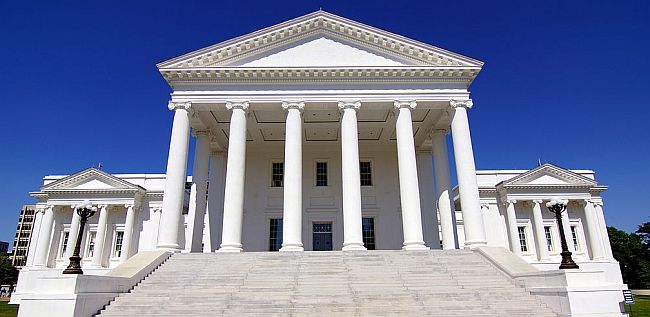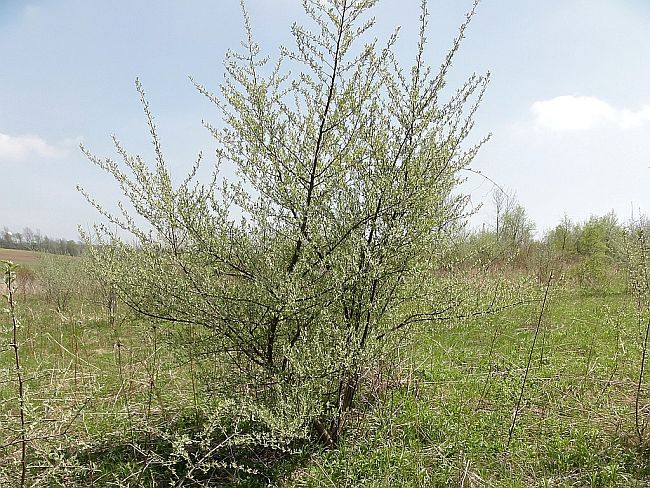Native and Invasive Plant Legislation in the 2022 General Assembly
The Virginia General Assembly convened January 12, 2022 and three bills were introduced in the House of Delegates that deal with native and invasive plants. The first step is to assign the bills to committees, then to subcommittees. Bills must pass the committee to be referred to the House for a full vote. View the Virginia House of Delegates Committees List.
Update 2/13/2022: Only HB314 remains viable in the 2022 session of the Virginia General Assembly with the Committee on Agriculture, Conservation and Natural Resources. View the amended substitute bill.
Bills move very quickly in the Virginia General Assembly. Contact your Senators on the Committee now.

Virginia State Capital Building
Photo by Skip Plitt, License CC BY-SA 3.0, via Wikimedia Commons
HB311 | Delegate Paul E. Krizek (D) – House District 44 | Track HB311
- Update 1/26/2022: House Subcommittee recommended laying on the table (6-Y 4-N). No further action in 2022.
- Directs the Secretaries of Natural and Historic Resources, Agriculture and Forestry, and Administration to coordinate the development of strategic actions for state agencies to take to prioritize the use of native plant species on state properties.
HB314 | (Delegate Paul E. Krizek (D) – House District 44) | Track HB314
- Update 2/09/0222: Referred to Senate Committee on Agriculture, Conservation and Natural Resources. View the amended substitute bill. Bills move very quickly in the Virginia General Assembly so please don’t delay in contacting Senators on the Committee.
- Update 2/8/2022: House approved by vote (99-Y 0-N).
- Requires the Commissioner of the Department of Agriculture and Consumer Services to develop model signs for retail establishments that sell plants that may be used to explain the benefits of native plants and the harm of noxious weeds and other invasive plants.
- Directs the Commissioner to develop model labels that may be used for the wholesale and retail sale of plants that indicate the common and scientific name of the plant, as well as whether it is native or invasive.
HB491 | Delegate David L. Bulova (D) – House District 37 | Track HB491
- Update 2/2/2022: House continued to 2023 with substitute in Agriculture, Chesapeake and Natural Resources committee. No further action in 2022.
- Amends the definition of “noxious weeds” to exclude plants that are commercially significant rather than commercially viable.
- Directs the Board of Agriculture and Consumer Services to implement a phase out period when a new plant is listed as a noxious weed.
- Directs the Department of Agriculture and Consumer Services to prepare a sign that shall be displayed at every nursery and retail plant outlet in the Commonwealth listing invasive plants sold in the Commonwealth.
- Authorizes the Board to adopt regulations for permits required to move noxious weeds, or a part thereof, into or within the Commonwealth.
- Directs the Department of Conservation and Recreation to update its invasive species list by January 1, 2024, and every four years thereafter.
- That no agency of the Commonwealth shall plant, sell, or propagate any plant listed on the Department of Conservation and Recreation’s invasive plants list unless necessary for scientific of educational purposes.
- That the Invasive Species Working Group shall prepare a budget request for the 2023 Session of the General Assembly to support full implementation of its existing Invasive Species Management Plan.
- That the Board of Agriculture and Consumer Services shall develop regulations requiring landscape designers and contract planting services to inform landowners whenever a planting will include a plant on the Department of Conservation and Recreation’s invasive plants list.
All proposed changes to the Code of Virginia for these bills are identified at Virginia’s Legislative Information System. Text additions are usually in italics.
Contacting Your Legislators
Visit the Who’s My Legislator? service, an online tool to determine which Virginia legislators represent you.
View the Virginia House of Delegates Committees List.

Autumn Olive (Elaeagnus umbellata), a highly invasive plant found in many parts of Virginia.
Photo by R. A. Nonenmacher at Wikimedia license CC BY-SA 4.0

Although Bulova’s proposed legislation has so much that I like, I am adamantly opposed to the proposed language. It will do more harm than good in the long run. For example, what is “commercially significant”? That creates a loophole through which English ivy, Japanese barberry and Nandina will always easily pass. Moreover, this process would commit us to continuing to work through the same noxious weed review process that we already have in place, with Ag playing a major role in deciding what is noxious and what is not. They are not inclined to focus on biodiversity and other major environmental concerns, at least not to the extent necessary. Rather, they’d be inclined to collaborate with the horticultural industry against more controls on what can and cannot be sold.
I do recognize that we are trying to make inroads, any inroads, but I think the continued focus on the noxious weed process is highly problematic. We need to move away from it.
I agree 100%. If a bill can’t get through on its own merits, then so be it. Voodooing it with industry-centric loopholes and platitudes hurts us in the short and long term.
Thank you for your comments, Susan. Please consider communicating your concerns to your Virginia legislators also.
I agree. We need to stop trying to placate certain groups.
I am wondering how to get in touch with someone on the Invasive Species Working Group.
Native plants are in need of some effective messaging to the masses… 🙂
Money needs to be budgeted for education programs (start in kindergarten), for marketing campaigns, and for enforcement when laws are ignored.
Respectfully,
Thank you for your comments.
The Invasive Species Working Group has already completed their work and submitted their report as described above. Please consider communicating your concerns to your Virginia legislators. Find your Virginia delegates and senators at https://whosmy.virginiageneralassembly.gov/.
I am late to this conversation, because I spend most of my time organizing, talking to people who need to have acted yesterday, and bending over for hours at a time working on invasive removal. I am shocked how many seedlings of English ivy, Asiatic bittersweet, Callery pear, wintercreeper, privet, burning bush, and a few others I pull up at my home, at the Montgomery Museum, and in Stadium Woods, an old growth forest. on the Virginia Tech campus. In Stadium Woods after removing carpets of English ivy and Wintercreeper and thickets of invasive shrubs for ten years with thousands of volunteers, sadly in the last year or two I am now pulling up hundreds of invasive seedlings. Seed bank? Maybe. But if the seed bank runs out the surrounding neighborhood is full of very old invasive vines on mostly rental property housing students. Three blocks away the Huckleberry Trail on an abandoned railroad track is surrounded on both sides with old invasive vines, trees and shrubs.
Years ago a farmer pointed out on a field trip with Dr. Jay Stipes that Miscanthus in his fields was a serious problem. Any wood lots that have Asiatic bittersweet will not produce straight trees. Seedlings of Callery pear will outcompete more desirable native trees. It seems that farmers would want control of Callery pear, miscanthus, Autumn Olive and more.
And anyone who has been paying attention knows that sedges, Golden ragwort, and other natives make good ground covers. Demand for native plants as is increasing, and some of the nurseries will flip what they are growing.
I do hope we seek the bill we want as stated above, the invasive plants are out there and people are changing their attitudes. A weak bill is useless.